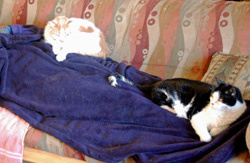Scattered Wisdom
Last Wednesday, I went in to have all four of my wisdom teeth removed. I then spent the rest of the week (up to and including while I’m writing this) in some variation of recovery. I was very lucky in that my wisdom teeth were not impacted, so they came out comparatively easily. Nonetheless, between recovering from sedation and lots of ibuprofen, I spent a very quiet week.

Me and My Feline Nurses
During some of my more alert moments, I found myself wondering why the darned things are called “wisdom teeth,” since they seem like a rather stupid design flaw, appearing late and crowding the rest of the established teeth to the point that they usually need to be removed.
Wikipedia, that repository of bits of information (if not actual wisdom), provided the following explanation:
“Although formally known as third molars, the common name is wisdom teeth because they appear so late – much later than the other teeth, at an age where people are presumably “wiser” than as a child, when the other teeth erupt. The term probably came as a translation of the Latin: dens sapientiae .”
So there!
In honor of being tired and vague, I’m going to share with you a variety of (hopefully interesting) bits of information.
First item… I was asked to participate in a possible anthology of stories set in the universe that the late Aaron Allston created for the “Strike Force” setting within the Champions superheroes role-playing system. I met Aaron Allston some years before his death and found him a lively and creative person. Additionally, I’ve written a lot of things, but I’ve never written a superhero story, so I’d enjoy the challenge.
The Kickstarter campaign is now live and very impressive. Even if you’re not interested in the possibility of my writing a superheroes story, you might want to take a look at it because a lot of work went into the design.
This campaign is particularly interesting in that it provides not only details regarding the proposed project, but also about why “Strike Force” (originally published in 1988) was an important landmark in the transition of role-playing games from dungeon crawls to full-fledged story-telling experiences.
Kickstarter is becoming an important way for smaller projects to be funded. I think it’s also a great way to give potential purchasers a way to indicate what form of a work they’d be interested in spending their hard-earned money on: electronic or print, illustrated or not, color art or black and white, soft-cover or hard-cover, supplemental materials or not. This permits the creators to put their energy and dollars where they’ll do the most good.
In fact, one of these days, I might design a Kickstarter campaign as a way of learning whether an off-beat project would merit the effort…
Second item… One of the things that I’ve been reading during my recovery is Grace Slick’s autobiography Somebody to Love. (Thank you, Alan Robson, for mentioning it in your recent “wot I red on my hols” column. Especially for the warning about the strawberries…)
During a discussion of her high school studies, Grace Slick makes the following statement:
“…I considered economics useless. Boy, was that a mistake: only later did I realize that ‘artists’ need to know business games and numbers. It’s unfair, really, because business types never have to learn to draw, sing, dance, or write lyrics.”
Whether she meant the final statement seriously or not (at least a third of the comments she makes need to be taken with a heavy shake of salt), I thought it was worth repeating. I’ve met a great many artists (writers, painters, poets, sculptors, dancers) who seem to think that taking an interest in the nitty-gritty business details immediately disqualifies them for the title “artist.”
This is really a self-destructive attitude. Being aware of the business ramifications of your particular field doesn’t make you less of an artist. What can make you less of an artist is doing projects you have no interest in simply because you think they’ll somehow get you ahead. That can make you a hack. But, funny thing, I’ve known a lot of poor hacks as well as starving artists. The one thing they had in common was thinking they were too smart to learn their business.
Third item… I did a couple short interviews recently with C.P. (Carolyn) Lesley. She did a good time preparing, and her questions have a nice bent shaped by her work as a historical writer. Maybe you’ll find something to enjoy. Part one is here, and part two here.
Fourth item… There’s no number four. I had stitches removed yesterday, so right now curling up with a good book sounds like my proper speed. Take care!





